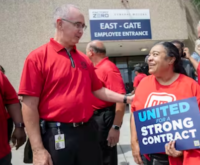By HAMZA HENDAWI
Associated Press
CAIRO (AP) _ Egypt‘s Islamist president announced Saturday that he was cutting off diplomatic relations with Syria and closing Damascus’ embassy in Cairo, decisions made amid growing calls from hard-line Sunni clerics in Egypt and elsewhere to launch a “holy war” against Syria’s embattled regime.
Mohammed Morsi told thousands of supporters at a rally in Cairo that his government was also withdrawing the Egyptian charge d’affaires from Damascus. He called on Lebanon’s Hezbollah to leave Syria, where the Iranian-backed Shiite militant group has been fighting alongside troops loyal to embattled President Bashar Assad against the mostly Sunni rebels.
“Hezbollah must leave Syria. This is serious talk: There is no business or place for Hezbollah in Syria,” said Morsi, Egypt‘s first freely elected president. Assad’s regime, he said, will have no place in the future of Syria after committing what Morsi called “horrors” against its people.
Morsi’s address, particularly his call on Hezbollah to leave Syria, and the fiery rhetoric used by well-known Muslim clerics this weekend point to the increasing perception of the Syrian conflict as sectarian. At least 93,000 people have been killed since turmoil there began more than two years ago.
The rally that Morsi addressed on Saturday was called for by hardline Islamists loyal to the Egyptian president to show solidarity with the people of Syria. Morsi addressed the rally after several hardline Islamist clerics spoke, all of whom called on him to do everything he could to help the Syrian rebels. Those attending the rally, about 20,000, chanted for solidarity with the Syrians, but occasionally deviated to shout slogans in support of Morsi.
The Egyptian president picked up a flag of the Syrian revolution and another of Egypt and waved them to the crowd as he entered the indoor stadium in a Cairo suburb.
Morsi also used the occasion to warn his opponents at home against the use of violence in mass protests planned for June 30, the anniversary of his assumption to power. Before he spoke, one hardline cleric, Mohammed Abdel-Maqsoud, recited an often repeated Muslim prayer against the “enemies” of God and Islam but used it to refer to the June 30 protesters.
The climate in the Cairo indoor stadium where the rally was held appeared to further entrench the division of Egypt into two camps: one led by Morsi, his Muslim Brotherhood and other Islamist groups, and the other grouping the secular and liberal opposition together with moderate Muslims, minority Christians and a large percentage of women.
In his address, Morsi repeated the allegation that Egyptians loyal to the now-ousted regime of autocrat Hosni Mubarak were behind the planned protests and that they were working against the January 2011 uprising that toppled Mubarak. As customary since taking office, he spoke of himself as a guardian and protector of the revolution, an assertion hotly disputed by his critics.
“Some who are delusionary want to pounce on the January revolution and think that they can undermine the stability that is growing daily or undermine the resolve that people have clearly forged with their will,” said Morsi.
“We will deal with them decisively and there will never be a place for them among us,” he told his supporters.
Morsi’s government is widely thought to have failed to tackle any of the seemingly endless problems facing the country, from power cuts and surging crime to unemployment, steep price rises and fuel shortages. The declared aim of the June 30 protests is to force Morsi out and hold early presidential elections.
Morsi’s allies say the protests have no legal basis and amount to a coup against his legitimate rule. They have been calling on opposition leaders to enter a national political dialogue to resolve the crisis, but the opposition has turned down the offer, claiming that previous rounds of dialogue did not yield results.
Spearheading the opposition to Morsi’s rule now is a youth protest movement called Tamarod, or rebel, which claims to have collected millions of signatures of Egyptians who want Morsi to step down. Organizers say they aim to collect the signatures of more people than those who voted for Morsi in the June 2012 election.
Some of the hard-line clerics who support Morsi have branded Tamarod activists as infidels or heretics and sought to frame their movement as an act against Islam.











